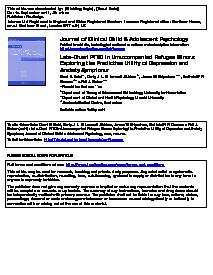Late-onset PTSD in unaccompanied refugee minors: Exploring the predictive utility of depression and anxiety symptoms
Following resettlement in Western countries, unaccompanied refugee minors (URM) are at risk of developing posttraumatic stress disorder (PTSD). It is unclear to what extent PTSD in this group may become manifest at later stages following resettlement and which factors are associated with late onset. We examined data from URM collected 1 (T1) and 2 years (T2) following resettlement for differences between groups with no PTSD, PTSD at T1, and late-onset PTSD (at T2 only) using multinomial regression and path analysis. Of the children and adolescents (ages 12–18) completing both assessments (N = 554), 223 (40%) met criteria for PTSD at T1, and 88 (16%) endorsed late-onset PTSD. Late-onset PTSD was associated with traumatic event exposure, older age, and low education. In the late-onset PTSD group, the predictive effects of traumatic event exposure on symptom severity at T2 were fully mediated by depression and anxiety symptoms at T1. These results suggest that late-onset PTSD is a clinically relevant problem among URM that may be heralded by early depression and anxiety symptoms.
Geachte bezoeker,
De informatie die u nu opvraagt, kan door psychotraumanet niet aan u worden getoond. Dit kan verschillende redenen hebben,
waarvan (bescherming van het) auteursrecht de meeste voorkomende is. Wanneer het mogelijk is om u door te verwijzen naar de bron
van deze informatie, dan ziet u hier onder een link naar die plek.
Als er geen link staat, kunt u contact opnemen met de bibliotheek,
die u verder op weg kan helpen.
Met vriendelijke groet,
Het psychotraumanet-team.
Reference:
Geert E. Smid, Gerty J.L.M. Lensvelt-Mulders, Jeroen W. Knipscheer, Berthold P.R. Gersons, & Rolf J. Kleber | 2011
In: Journal of Clinical Child and Adolescent Psychology, ISSN 1537-4416 | 40 | 5 | 742-755
http://www.tandfonline.com/doi/abs/10.1080/15374416.2011.597083
In: Journal of Clinical Child and Adolescent Psychology, ISSN 1537-4416 | 40 | 5 | 742-755
http://www.tandfonline.com/doi/abs/10.1080/15374416.2011.597083


